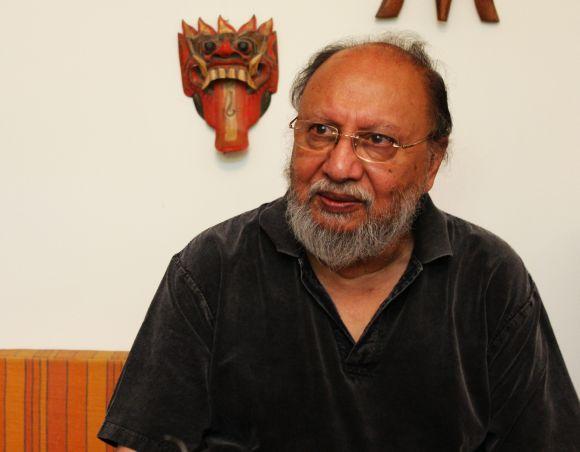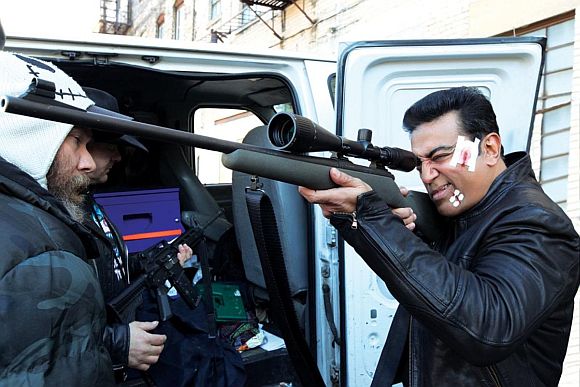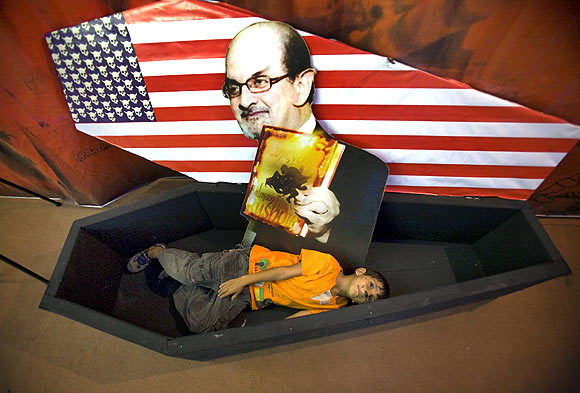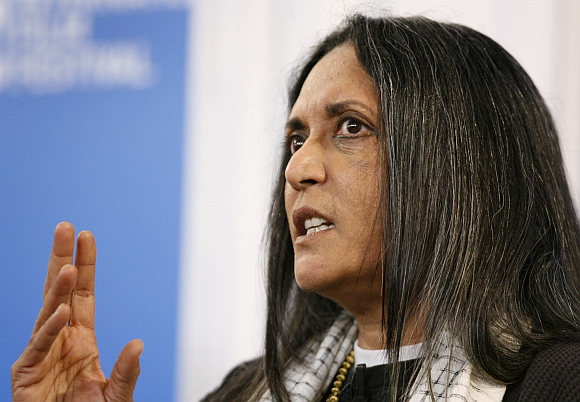 | « Back to article | Print this article |
Rushdie, Haasan, Nandy: Till when will we cave in?
Mitali Saran on why Indians always adopt the brace position while standing up to intimidation
Salman Rushdie found the perfect phrase when he said, during a recent television interview, that India is experiencing a cultural emergency. He's in a position to say this, having been prevented from attending last year's Jaipur Literature Festival, warned against attending it this year, and banned from entering Kolkata for ... well, for being Salman Rushdie.
From the First Information Report that closed down a photography exhibition in Delhi, to the FIR filed against a Facebook user for commenting on Bal Thackeray's funeral, to the multiple FIRs filed against sociologist Ashis Nandy for his comments at the JLF on caste and corruption ... Wait, do you see a pattern here?
You may not get more than a smirk out of the police if you try to file an FIR against your rapist, but mention that you're piqued by somebody's opinions, and everyone from the cop to the chief minister will become wildly interested.
Click NEXT to read further...
Democracies must make real efforts
In the instance of the recently upheld ban on Kamal Haasan's film, Vishwaroopam, Chief Minister J Jayalalithaa wondered, at a press conference, whether she should wait for people to get violent before taking action.
Well -- yes. Or take pre-emptive action against the rioters, not against the film. Jayalalithaa said that she simply does not have a police force adequate to the challenge of protecting over 500 theatres. It's true that it isn't easy to maintain the peace even in a relatively mature society, let alone one that acts like a bunch of tempestuous toddlers.
But one way of ensuring the need for security is for authorities to treat the film as potentially incendiary even though the censor board has passed it.
Democracies are conceived as open societies hinging on rule of law, which means that the ideal tempering influence is not a heavy police hand, but self-government by citizens. Democracies must, therefore, make real efforts to make citizens understand both the rights and responsibilities of citizenship, and share with the police the burden of maintaining peace.
Click NEXT to read further...'Self-governing' does not mean 'polite'
'Self-governing' does not mean 'polite'. It does not mean docile, or pleasing. It means lawful and non-violent. Discuss things, protest all you want, shout, condemn whatever offends you by speech and placard and art -- designate a day to heap curses on someone, as groups in Mumbai have done to protest Rushdie's presence in India -- but in a democracy, you should end up in the clink for hitting people, not for liking Facebook updates.
India has made a practice of so easily and regularly caving in to its own fears of a 'law and order problem' that now all it takes is a little growling by vocal minorities to authorities to shut down anything that displeases.
We conduct discussions about freedom of expression in unexamined terms and catch-all phrases like 'insult' and 'disrespect' and 'hurt sentiments' and 'in a bad light'.
These discussions invariably seek the end goal of making the person who's feeling bad, feel better -- but that is not the goal of the law. The goal is to ensure non-violence between people who will invariably disagree.
Reality check: there are terrorists who happen to be Muslim. It is absurd to say that telling a story about such a thing is disrespecting a community, and even more absurd for the law to bend to that statement. When Haasan says he is a secular man in search of a secular state, he speaks for millions of people who are fed up with the shrinking space for expression and debate.
Click NEXT top read further...
India is caught in the clash between tradition and modernity
When filmmaker Deepa Mehta says that 'something broke' in her relationship with India when her film Water was shut down, she speaks for millions of Indians who are alienated from a homeland that is constantly cowed by hooliganism.
It is not because Nandy is an eminent academic, or Rushdie an eminent novelist, or M F Husain an eminent artist, that India should protect their rights. Eminence should not be the guarantor of rights. Democracy isn't about exceptionalism, but about the rights of every citizen.
Perhaps India is fragile -- that wouldn't be surprising in a country caught in the clash between tradition and modernity. But every time the law upholding freedom of expression is ignored, sidestepped or watered down, we deepen rather than heal those fissures. And every time an artist or writer or any other citizen apologises for a lawful expression or act, they help to legitimise intimidation and mobocracy.
Nurturing fragility suits the political establishment just fine. It's no wonder that so many talented people who aren't actually hounded out, simply leave India. Standing up to intimidation requires courage and energy and resources, and may or may not be worth the trouble.
For those who stay, this is a kind of emergency, and anyone looking to survive it will have to adopt the brace position.
TOP photo features of the week
Click on MORE to see another set of PHOTO features...





